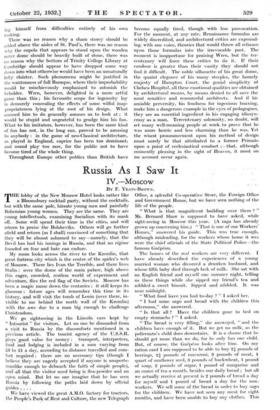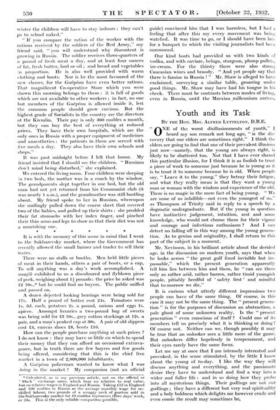Russia As I Saw It
IV.—Moscow By F. YEars-Baow N.
THE lobby of the New Moscow Hotel looks rather like a Bloomsbury cocktail party, without the cocktails, but with the same pale, hirsute young men and painfully Bohemian young women. They are the same. They are young intellectuals, examining Socialism with its mask off. • Some will spend their time in the cities, and will return to praise the Bolsheviks. Others will go further afield and return (as I shall) convinced of something that they will be almost ashamed to say—namely, that- the Devil has had his innings in Russia, and that no regime founded on fear and hate can endure.
My room looks across the river to the Kremlin, that great fortress city which is the centre of the spider's web of Moscow. There lies Ivan the Terrible, and there lives Stalin : over the dome of the main palace, high above this eager, crowded, restless world of experiment and adventure, flies She red flag of the Soviets. Moscow has been a magic name down the centuries :..it still keeps its glamour : future ages will remember this time in its history and will visit the tomb of Lenin (over there, in- visible to me behind the north wall of the Kremlin) with the awe due to a man big enough to challenge Christendom.
We go sightseeing in the Lincoln cars kept by " intourist " for visitors. Let no one be dissuaded from a visit to Russia by the discomforts mentioned in a previous article. The tourist agency of the U.S.S.R. gives' good value for money : transport, interpreters, fo6a and lodging is included in a sum varying from £3 to £1 a day, according ta distance travelled and com- fort required : there are no necessary tips (thOugh I belieYre they are eagerly accepted if anyone is, unsports- manlike enough to debauch*the faith of simple people), and all that the visitor need bring is flea-powder and an open mind. But Iet no one imagine that he has seen Russia by following the paths laid down by official guides , .- We have viewed the great A.M.O. factory for tractors, the People's Park of Rest and Culture, the new Telegraph Office, a splendid. Co-operative Store, the Foreign:Office and Government House, but we have seen nothing of the life of the people.
" What is that magnificent building over , there ? " Mr.. Bernard Shaw is supposed to have asked, while sight:seeing In Moscow this year. (A saga has already grown up concerning him.) " That is one of our Workers' Homes," answered his guide. This was true enough, although misleading, for the workers whose home it was were the chief officials of the State Political Police—the famous Guepeou. - The homes of the real workers are very different. I have already described the experiences of a young married woman who divorced a drunken husband, and whose fifth baby died through lack of milk. She sat with an English friend and myself one summer night, telling us these things while she sipped my friend's tea and nibbled a sweet biscuit. Sipped and nibbled. It was near midnight.
" What food have you had to-day ? " I asked her.
" I had some sago and bread with the children this afternoon," she answered.
" Is that all ? Have the children gone to bed on empty stomachs ? " I asked.
" The bread is very filling," she answerd, " and the children have enough of it. But we get no milk, as the policeman's child does downstairs. It is a shame that he should get more than we do, for he only has one child. But, of course, the Guepeou looks after him. On my ration card I am supposed to be able to buy 2k pounds of herrings, 21- pounds of macaroni, 8 pounds of meat, 1 quart of sunflower seed, 8 pounds of buckwheat, 1 pound of soap, 2 pounds of sugar, 1 pound of margarine and an ounce of tea a month, besides our daily bread ; but all we actually receive at present is 2 pounds of bread a day for myself and 1 pound of bread a day for the non- workers. We sell some of the bread in order to buy sago for the children. We have not seen any meat for eight months, and have been unable to buy any clothes. This winter the children will have to stay indoors : they can't go to school naked."
" If you compare the ration of the worker with the rations received by the soldiers of the Red Army," my friend said, " you will understand why discontent is growing in Russia. The soldier receives three-quarters of a pound of fresh meat a day, and at least four ounces of fat, fresh butter, lard or oil ; and bread and vegetables in proportion. He is also well provided with warm clothing and boots. Nor is he the most favoured of the new classes, for the Guepeou have even better rations. That magnificent Co-operative Store which you were shown this morning belongs to them : it is full of goods which are not available to other workers ; in fact, no one but members of the Guepeou is allowed inside it, lest the common people should grow envious. But the highest grade of Socialists in the country are the directors at the Kremlin. Their pay is only 300 roubles a month, but they can buy the best of everything at reduced prices. They have their own hospitals, which are the only ones in Russia with a proper equipment of medicines and anaesthetics : the patients in .them are served with five meals a day. They also have their own schools and shops."
It was past midnight before I left that house. My friend insisted that I should see the children. " Russians don't mind being disturbed," she explained.
We entered the living room. Four children were sleeping in two beds, the mother was in a couch by the .window. The grandparents slept together in one bed, but the old man had not yet returned from his Communist club (it was nearly 1 a.m.), and the grandmother was still bustling about. My friend spoke to her in Russian, whereupon she smilingly pulled down the coarse sheet that covered two of the babies, and pulled up their shirts : she prodded their fat stomachs with her index finger, and pinched their thin arms and legs to show us that their diet was not a nourishing one.
* * * *















































 Previous page
Previous page